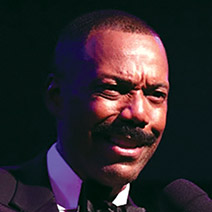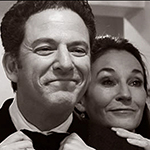T. Oliver Reid
Distingué…The Saloon Singer and His Songs:
A Salute to Bobby Short
Birdland Theater, NYC, September 9, 2018
Reviewed by Alix Cohen for Cabaret Scenes

It’s frankly startling to see a mustachioed T. Oliver Reid take the stage at Birdland Theater bearing so close a resemblance to celebrant Bobby Short, whose birthday is September 15. Though young and svelte, facial hair and bespoke attire strongly evoke the icon. Reid shares Short’s rippling vibrato, extravagant nature, and predilection for emphasis/volume that dramatically ebbs and flows. To this, the performer brings acting and dancing chops Short would undoubtedly have appreciated, not to mention a lustrous tenor.
The show is stylized and stylish. This is a theater performer who knows his way around the more intimate genre of cabaret. He fixes on eyes in the audience, withdrawing only when sentiment is appropriately internalized, and moves (or dances) across the small stage. It’s a pleasure to watch an artist who takes lyrics seriously—I mean that literally. There’s no errant grin or sped-up version of a melancholy lyric. (Only a dance turn during the Gershwins’ “But Not for Me” feels out of keeping.)
Anecdotes bridge a selection of songs Short favored—“just the beautiful music of The American Songbook.” With a nod to the Café Carlyle legend’s habit of including a bit of modern material, Reid also offers several contemporary numbers.
Cole Porter’s “I’m Throwing a Ball Tonight” evokes erupting champagne. The ebullient song is mirrored towards the end of the program by a declaratory “Let’s Start Tomorrow (Tonight)” (Marc Shaiman/Scott Wittman from the NBC series Smash): “Can’t cha feel, baby, we’re in the chips/Tomorrow’s our lucky day/I can feel gold at our fingertips/We’ll prosper if we parlay.”
A demonstrative “I Get a Kick Out of You” (Porter), replete with peek-a-boo tenor, is playful and engaging. Porter’s “I’ve Got You Under My Skin” exudes old-fashioned refinement. Reid emits a dark, little laugh with “wake up to reality,” dancing with an unseen partner. Suddenly the dream fades and he doesn’t see the man any more—a wonderful moment. “I don’t believe that song was written by Cole Porter for his wife” places us firmly among up-to-date mores. Reid’s pronouns are rightfully male.
Also treated in particularly sophisticated fashion are “You Are Not My First Love” (Bart Howard/Peter Windsor), which is insouciantly talk/sung; a playful, polished “Satin Doll” (Duke Ellington/ Billy Strayhorn/Johnny Mercer)—“there was always a little uptown mixed with the downtown,” Reid notes; and “I’m in Love Again” (Porter) with Larry Yurman’s jazz-age vamp and frisky, light-fingered accompaniment.
“Isn’t It Romantic?” (Richard Rodgers/Lorenz Hart) sways its way to an enormous note that blankets the club. “That Old Black Magic” (Harold Arlen/ Mercer) finds him palpably besotted. “Sand in My Shoes” (Frank Loesser/Victor Schertzinger) arrives mischievous. Reid pats his crossed knees, claps, and lets out a tart little “whee!”
Some material is organically linked. The stage-whispered “Something to Live For” (Ellington/ Strayhorn) sailing across a stroked piano and “I Got It Bad (and That Ain’t Good)” (Ellington/Paul Francis Webster) with a delicious pause before “when the weekend’s over” as if it’s difficult to get the words out, seem to belong. A crushed velvet “I Travel Alone” (Noël Coward), “Nobody’s Heart Belongs to Me” (Rodgers & Hart), and Porter’s “Night and Day,” first haunted, then overwhelmed (another enormous note), works wonderfully.
Much as I honor it, moving as it was, I could’ve done without yet another “Send in the Clowns” (Stephen Sondheim.) (Apparently Short was the first person to record the song outside of the cast recording of A Little Night Music.) “Every Time We Say Goodbye”—unhurried, pristine, and shimmering—closes the show.
T. Oliver Reid’s full-frontal charm is impossible to resist. All of a piece and extremely talented, he can get away with self-conscious presentation that embodies artistry, not excess, much like Bobby Short. With luck this will be repeated.





